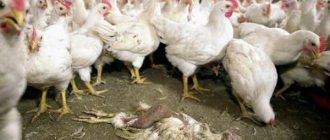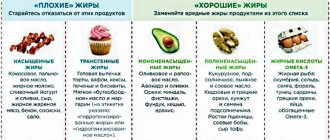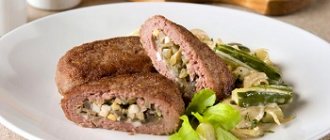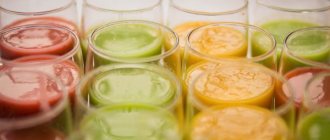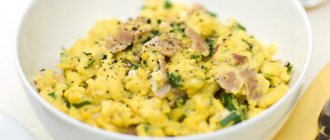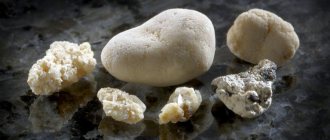Author Peter Deryabin
05/20/2004 08:48 (Updated: 07/02/2021 19:52)
Health » Health and prevention » Diet
What diet should you follow for urolithiasis? Candidate of Medical Sciences, urologist of the highest category Evgeniy Burenin shared his advice .
Mediterranean diet
Features of proper nutrition for urolithiasis of the kidneys
In case of urolithiasis, it is very important to adhere to the correct diet, which is compiled depending on the chemical composition of the stone.
Not in all cases, a diet will help completely dissolve the stone, but in any case, a special diet is a good preventive measure aimed at preventing the formation of new stones. There are three types of kidney stones:
- Phosphate;
- Urate;
- Oxalate.
Depending on the type of stone, some foods are completely excluded from food, while others, on the contrary, need to be added to your daily diet. Let's look at each type of stone and the basic rules of the diet in more detail.
Diet for phosphate stones
The most important principle of this diet is to eat foods that reduce the excretion of calcium by the kidneys and acidify the urine, changing its composition from alkaline to acidic.
It is necessary to completely exclude from the diet:
- Alcohol;
- Coffee, chicory and carbonated drinks;
- Mineral water with phosphorus;
- Canned meat and fish;
- Pizza and snacks;
- Vegetables, fruits and greens rich in calcium and phosphates;
- Spicy snacks and spices.
In addition, it is necessary to minimize the consumption of table salt in food and dairy products containing a lot of calcium (milk, cheese, feta cheese and cottage cheese). If you can’t give up salt completely, you need to reduce its consumption, at least to 7 grams per day.
Allowed foods that should be in the diet:
- Meat (preferably veal and chicken);
- Fish;
- Mushroom soups;
- Pasta and cereals;
- Vegetables that contain small amounts of calcium: beans, pumpkin, peas, Brussels sprouts and asparagus;
- Sour berries: cranberries, lingonberries and currants;
- Juices and jelly from sour apples and grapes;
- Weak or herbal teas;
- Vegetable and butter;
- Bran bread and sprouted grains;
- Mineral waters containing bicarbonate and sulfate (“Arzni” or “Dolomite Narzan”).
You cannot completely exclude foods with calcium from your diet - this can lead to a biochemical abnormality when the level of calcium in the blood drops below normal. Once a week you can eat cottage cheese, cheese or nuts - this will not cause the growth of new stones. Every day you need to eat 90 grams of protein, 400 grams of carbohydrates and 100 grams of fat. The drinking norm of water per day is 2.5 liters.
Sample menu for phosphate stones
- Breakfast: rice porridge on water with a spoon of butter, bread with bran, weak tea.
- Snack: rosehip decoction with cookies.
- Lunch: mushroom soup, steamed cutlets with a side dish of buckwheat, jelly.
- Afternoon snack: cranberry juice, crackers.
- Dinner: millet porridge with pumpkin, a spoonful of honey, blackcurrant compote.
- Breakfast: oatmeal with water, whole grain bread with honey, rosehip infusion.
- Snack: lingonberry juice with bagel.
- Lunch: chicken soup, veal stew with pearl barley porridge, jelly.
- Afternoon snack: oatmeal cookies with rosehip infusion.
- Dinner: minced liver, bran bread, oatmeal jelly.
- Breakfast: baked fish, side dish of rice, bran bread, green tea.
- Snack: pancakes, rosehip infusion.
- Lunch: fish soup, meat casserole, weak tea.
- Afternoon snack: marshmallows, rosehip infusion.
- Dinner: pasta with a spoon of butter, lingonberry juice.
Types of kidney stones and types of diets for each
- Urats. An alkalizing diet is used, including dairy products, vegetables, and fruits. Soups made with strong meat broths, canned fish, offal, eggs, cheeses, and smoked meats are limited or completely excluded. Meat is introduced into the diet in limited quantities.
- Oxalates. A diet based on foods containing magnesium is used. Peas and fresh black bread are recommended. The consumption of foods containing oxalic acid is limited. Sorrel, spinach, beans, chocolate, citrus fruits, tea and coffee, fresh pepper and in the form of spices are excluded.
- Phosphates. Additionally, the diet includes cranberries, lingonberries, grapes, rice, buckwheat, and citrus fruits. You can read more about nutrition with phosphates in the article “Phosphates: getting rid of the problem with diet.”
On a note
For any type of stones, it is necessary to exclude fried, spicy, smoked, pickled foods, alcohol and fast food.
Diet for urate stones
Urate stones are formed due to the increased content of uric acid in urine. The main principle of the diet for urate stones is to limit the consumption of purine-containing foods, restore protein metabolism and speed up the removal of stones.
It is necessary to completely exclude from the diet:
- Alcohol;
- Coffee, strong tea and cocoa;
- Cranberry juice;
- Kidneys, liver, meat of young animals and animal fats;
- Meat and fish broths;
- Canned food and marinades;
- Cauliflower, sorrel and spinach;
- Mushrooms, legumes and figs.
You should also reduce your consumption of cheese, eggs, meat and fish dishes. Meat and fish are only allowed to be eaten boiled, no more than twice a week.
Authorized products:
- Vegetables (potatoes, tomatoes, cucumbers, sweet peppers, beets, eggplants, radishes);
- Fruits and berries;
- Dairy and fermented milk products;
- Cereals and pasta;
- Shrimp, squid, mussels, oysters (in moderation);
- Honey, dried fruits and jam (in moderation);
- Alkaline mineral waters (“Essentuki”, “Narzan”, “Borjomi”, “Obukhovskaya” or “Jermuk”);
- Herbal teas made from clover, blackcurrant leaves, burdock or dandelion roots.
While following a strict diet, you should not starve - this can lead to an increase in uric acid. Once a week you can and should have fasting days, eating only vegetables or dairy products. In the summer, watermelon is suitable for food on a fasting day; it has a strong diuretic effect; during the day you need to eat 1.5-2 kg of watermelon pulp. The daily diet should contain 80 g of protein, 400 g of carbohydrates and 90 g of fat. The drinking norm of clean water per day is 2 liters.
Sample menu for urate stones
Your daily diet must include 400 grams of bread and 50 grams of sugar.
- Breakfast: rice porridge with fruits and berries, weak tea with milk.
- Snack: pancake with cottage cheese, rosehip infusion.
- Lunch: milk soup, boiled chicken with mashed potatoes, dried fruit compote.
- Afternoon snack: a glass of kefir, vinaigrette.
- Dinner: cheesecakes, glass of juice.
- Breakfast: dumplings stuffed with berries, yogurt sauce, bread and butter, weak tea.
- Snack: fruit salad, jelly.
- Lunch: rice soup with eggplant, stewed cabbage, black and red currant compote.
- Afternoon snack: potato casserole, glass of kefir.
- Dinner: Lenten potato zrazy, homemade yogurt, berry jelly.
- Breakfast: loaf with butter and cheese, vinaigrette, weak tea with milk.
- Snack: noodles with rosehip infusion.
- Lunch: onion soup, durum wheat pasta with vegetables, dried fruit compote.
- Afternoon snack: steamed omelette, cookies, glass of jelly.
- Dinner: yogurt parfait with muesli, a glass of freshly squeezed juice.
Diet for oxalate stones
Oxalate stones are formed with increased consumption of vitamin C and oxalic acid. The purpose of this diet is to stop the formation of new salt stones, and to simplify the process of dissolution of already formed crystals. The diet will only be effective if you use drug therapy, which should be prescribed by a doctor. The diet presented below should be followed for life to prevent the recurrence of stones.
The following are completely excluded from the diet:
- Tea, coffee, cocoa;
- Chocolate, ice cream, jelly;
- Fatty meat and jellies;
- Spicy seasonings;
- Beets, lettuce, spinach, celery, parsley, sorrel, asparagus and rhubarb;
- Canned meat and fish.
In addition to prohibited foods, you need to significantly limit the consumption of such foods as:
- Beef, chicken;
- Brussels sprouts, red and sauerkraut;
- Carrots, tomatoes, green beans;
- Citrus;
- Sour apples, cranberries, currants, rose hips, strawberries.
The diet is not as strict as it seems at first glance. From the list of permitted products you can prepare varied and tasty dishes. However, you will have to give up fried food and replace it with food cooked in the oven or steamed.
Allowed foods that should be in the diet:
- Cereals;
- Bran or whole grain bread;
- Dairy and fermented milk products;
- Potatoes, carrots, cabbage, peas, pumpkin, turnips;
- Bananas, sweet apples, pears, apricots, grapes, watermelons, melons;
- Vegetable and butter;
- Honey, sugar (no more than two dessert spoons per day);
- Nuts and whole grains;
- Cilantro;
- Green and herbal teas (from birch leaves, violet roots, madder);
- Fruit juices;
- Mineral water.
The daily diet for oxalate stones should contain 100 g of protein, 300 g of carbohydrates and 60 g of fat. Dairy and fermented milk products are recommended to be consumed in the first half of the day. You can eat 100 grams of fish daily or 200 grams three times a week. The drinking norm of water per day is 3 liters.
Sample menu for oxalate stones
- Breakfast: oatmeal with prunes, apple juice.
- Snack: cottage cheese with sour cream, fermented baked milk.
- Lunch: vegetable cabbage soup, steamed turkey cutlet, mashed potatoes, jelly.
- Afternoon snack: carrot salad with honey, kefir.
- Dinner: spaghetti with boiled beef, cabbage salad, berry jelly.
- Breakfast: buckwheat porridge with a piece of butter, green tea.
- Snack: dried whole grain bread with bran and butter, lingonberry juice.
- Lunch: pumpkin soup, vegetable stew with boiled beef, jelly.
- Afternoon snack: baked apples, mineral water.
- Dinner: lean fish, side dish of rice, stewed zucchini, juice.
- Breakfast: fresh cabbage salad with a spoon of vegetable oil, juice.
- Snack: lingonberry juice with bran, dried bread.
- Lunch: soup with rolled oats, stewed cabbage with chicken, herbal tea.
- Afternoon snack: fruit salad, jelly.
- Dinner: carrot cutlets, oven-baked fish, apricot compote.
Drug treatment of KSD will give positive results only if you follow the right diet.
All food products contain an acidic or alkaline environment. Normally, the alkaline reaction in the human body should be no lower than 7.35-7.45 pH. Changes in urine acidity affect the formation and type of stones. If the acidity level is below normal, new stones may form. The most important factor influencing the acidity of urine is food. When you have urolithiasis, it is extremely important to eat right, so you need to exclude all harmful and acidifying foods from your diet: alcohol, chips, sweets and baked goods. After waking up 20 minutes before meals, it is very useful to drink a glass of clean water. For any type of stones, you need to arrange fasting days, eating only fruits and water. With phosphate stones, fruits are replaced with permitted vegetables.
Authorized Products
The therapeutic diet for kidney stones should include foods that alkalinize the urine (except in cases where the patient has phosphaturia, and a “shift” to the acidic side is necessary). These include fruits and vegetables, dairy products.
The consumption of foods containing magnesium and B vitamins, which remove oxalates and urates, is indicated. It is necessary to increase in the diet the amount of foods rich in vitamin A, which is important for the regeneration of the epithelium of the mucous membranes of the kidneys and urinary tract.
Low-mineralized waters and decoctions of medicinal herbs have anti-inflammatory properties. The consumption of vegetable oils is increasing as a replacement for animal fat and plant fiber, which prevents the deposition of salts and weight gain, and normalizes intestinal motor function.
The list of permitted products includes:
- bread made from 1st and 2nd grade wholemeal flour or bran (a source of B vitamins);
- fresh vegetable salads;
- soaked and pickled vegetables;
- cereals in moderation;
- pasta in moderation;
- sweet berries and fruits, watermelons, pears, apples, plums, grapes (reduce oxalates);
- potatoes, pumpkin, zucchini, carrots, tomatoes, any other vegetables;
- lean meats and poultry: chicken, turkey, beef;
- low-fat fish: cod, pollock;
- milk, non-sour cottage cheese, fermented milk products;
- mild and unsalted cheeses;
- eggs in any form, limited yolk;
- dried fruits (source of potassium);
- vegetable, dairy, tomato sauces;
- marmalade, honey, pastille, meringues, jam;
- weak tea or coffee with milk or lemon, a decoction of wheat and oat flakes, bearberry, corn silk;
- vegetable oil, butter limited.
